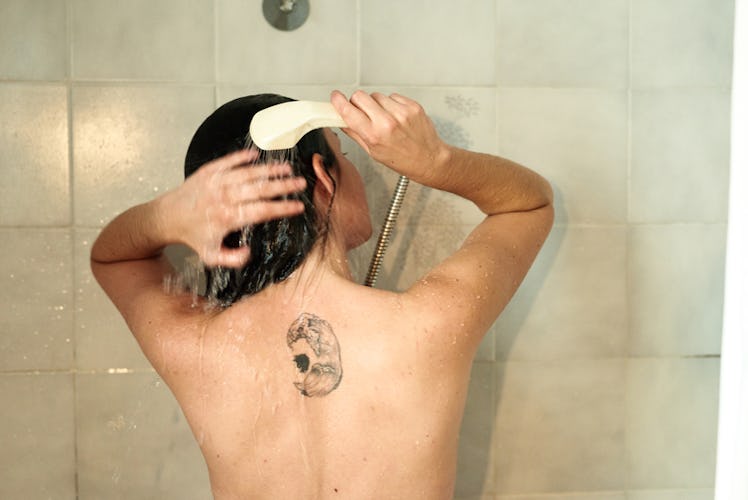
This One Tweak In Your Nighttime Routine Might Help You Fall Asleep So Much Faster
I don't know about you, but I will try just about anything I can to help me fall asleep at night. From diffusing essential oils, to drinking some chamomile tea, to listening to the sounds of rain while doing breathing exercises, I'm here for all of it. Lately, I've had some luck winding down with a shower before I tuck in for the night, but does showering at night actually help you sleep, or is it just a coincidence? As it turns out, there may actually be some science to the sleepy benefits of a nighttime rinse — and hey, if nothing else, it's an easy way to save yourself a few extra minutes getting ready in the morning, right?
For instance, a small 2000 study published in the Journal of Physiological Anthropology tracked the effects of daily bathing before bed in nine different women. The volunteers in the study were assigned to one of three "sleep conditions:" They would go right to sleep after bathing, sleep after a hot foot bath, or go to bed without doing either of these things. According to the study's results, the women in the two bathing-before-bed groups were able to fall asleep much more quickly than those who didn't bathe at all before going to sleep. In the study's abstract, the researchers recommended "both daily bathing and hot footbath" as a healthy (not to mention luxuriously enjoyable) way to promote better sleep.
The thing to remember, however, is when exactly you bathe. It's all about timing, my friends.
Shelby Harris, director of behavioral sleep medicine at New York’s Montefiore Medical Center, told TIME that "showering in the earlier evening gives your body a chance to cool off and can even trigger sleep." That cool-down effect, Harris explained, essentially tells the body that it's time to pack it in for the night. She added that, while most research has focused only on taking baths before bed, a 20-minute shower would have a similar effect for healthy sleep. Harris recommended hopping in the shower about an hour and a half before you want to head to bed, as this will give your body enough time to experience that relaxing cool-down effect. So, no, if you're tossing and turning all through the night, an impromptu 2 a.m. shower probably won't do much to help you snooze — sorry, guys.
In fact, the process of cooling down is actually a really important part of falling asleep in general, and taking a shower at the right time can help kickstart this process.
The results of a 2008 study published in the journal Brain demonstrate just how important it is to cool your body down before bed. This research showed that warming up your skin, without significantly spiking your core body temperature, can drastically improve both the quality and the onset of sleep (meaning how long it actually takes you to pass out for the night). By warming the surface of the skin just right — like when you take a warm, but not-too-hot shower — you can knock your core body temperature down just a couple notches, and set yourself up for a totally blissful night of rest.
Now, technically speaking, that cool-down effect is actually something that your body does naturally all on its own, roughly an hour or so before you go to sleep, according to Huffington Post. But a quick shower a couple hours before hitting the sheets basically helps guarantee that your core body temperature goes exactly where it needs to for a quality sleep.
Temperature plays a big role in regulating your circadian rhythm, HuffPost reports, and this might actually explain why insomniacs have so much trouble getting to sleep.
According to research from the University of South Australia's Centre for Sleep Research, people who suffer from insomnia often have a higher core body temperature, which makes it a lot harder for the body to wind down and go to sleep. The warmth acts as a kind of signal to the brain that things are still happening that the body needs to stay awake for. Kind of mind-blowing, right?
So, if you already know you have insomnia, and nothing else has worked for you up until this point, or even if you just struggle with the occasional toss-and-turn night, why not try moving your morning shower to the early evening? Like I said, the worst that can happen is you save yourself some time come morning.